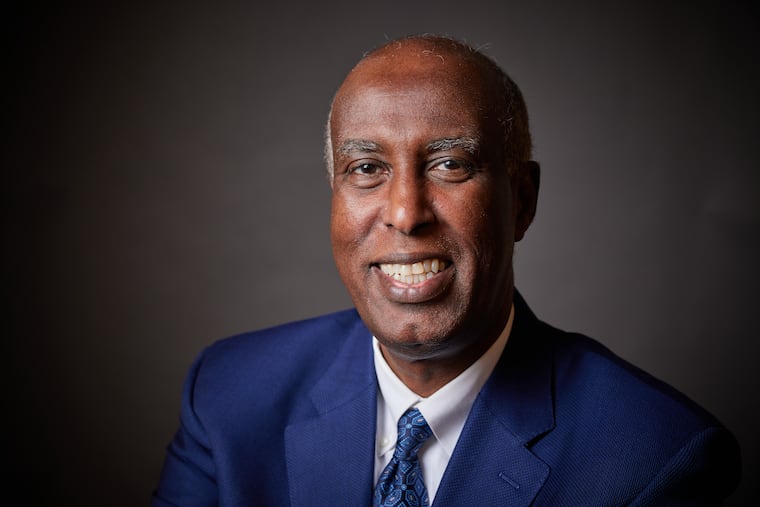Meet Said Ibrahim, the new dean of Jefferson’s medical school
His research focuses on how race, income and other socioeconomic factors affect access to care and health outcomes, and diverse health care providers are critical to addressing that shortcomings.

Said A. Ibrahim, the first Black medical school dean at Thomas Jefferson University, has big ideas for putting one of the nation’s oldest medical schools at the forefront of training next-generation physicians.
Ibrahim, a physician and health equity researcher, took the helm at Sidney Kimmel Medical College at the beginning of December. He most recently worked as a senior vice president at Northwell Health, the largest health care system in New York State.
Ibrahim, who is from East Africa, lived in Philadelphia early in his career, working as a lab tech sequencing DNA for The Wistar Institute, a National Cancer Institute-designated research hub. He left to attend medical school at Case Western Reserve University in Cleveland and later earned a master’s degree in public health at Harvard University.
He has also worked as chief of medicine at the Philadelphia VA Medical Center and vice chair of medicine at University of Pennsylvania’s Perelman School of Medicine.
Ibrahim’s research focuses on how race, income, and other socioeconomic factors affect access to care and health outcomes. Diverse health-care providers are critical to addressing decades of health disparities, and he sees his new role as an opportunity to help build that workforce.
“We are going through both great opportunities, in terms of the future of medicine, and great challenges to the people we serve,” Ibrahim said. “This is an opportune time to join this expanding system, so I can impact the future generation.”
Ibrahim spoke with The Inquirer in an interview that has been edited for length and clarity.
What about the position and Philadelphia appealed to you?
The reason I’m here and why this job excites me is I want to be part of the effort to make Jefferson’s medical school and health system part of the community of Philadelphia. I want the community to see Jefferson as one of its own, and for Jefferson to be part of the community. To do that, we have to train the right students in the right setting, recruit the right faculty, and promote the scientific community. The way we discover future medicines is by doing the research. I want to make sure the Jefferson community is part of that.
What are the lessons you want to impart on incoming medical students?
I’ve been studying how health care is delivered to people from different socioeconomic backgrounds. What I’ve learned is we have a long way to go to make sure that the great cures in science are accessible to all, that people can afford the medications they need. We want to be able to train physicians who really care about the community and the relationship with the patient.
The relationship between patients and physicians used to be a very trusting relationship, but it’s eroded. Technology is growing so fast and medical knowledge accumulates so fast, it’s a challenge. Do we have the setting to train the kind of physicians and health care workforce that’s ready to meet the challenges of the community and make sure the technology doesn’t do harm? Are we training the kind of people who are able to build relationships, think for themselves?
The workforce of the future really needs to reflect the communities they serve. I believe strongly that we have to build a diverse and inclusive workforce that’s ready for the challenge and that will elevate the communities.
How do you plan to advance diversity at Jefferson?
We need to reach college students early — as early as eighth grade — and expose them to careers in medicine. The way you create a more diverse pool of students is by raising the awareness that young people can go into medicine regardless of their background.
We also need to find ways to make the cost of medical school manageable for those who can’t afford it. It’s very expensive to go to medical school. We need to raise funds for scholarships for students from low economic backgrounds.
To attract a diverse student population, we also have to have diversity of leadership and staff.
» READ MORE: Thomas Jefferson University president who liked controversial tweets resigns
How will you use social media, after Jefferson’s former university president came under fire for “liking” controversial Tweets and resigned?
Social media is a reality that many of us live with. The central issue is being able to connect with students — that’s the goal and the most important aspect. My goal is to connect with them in the ways they feel comfortable connecting.
» READ MORE: Jefferson plans to acquire Lehigh Valley Health Network, forming a 30-hospital network
What does Jefferson’s potential acquisition of Lehigh Valley Health Network mean for the medical school?
Some trainees will come from that area, and our trainees — medical students, residents, fellows — will have more opportunities to go there and train under different settings. The combination of Lehigh Valley, which serves a larger rural community, with our urban community provides us a much richer and diverse community for our students to get more training.
There’s also the research advantage: The larger the size of the health system, the better opportunity to do good research. We have a much larger data set. We want to study patients from different social backgrounds — rural and inner city.